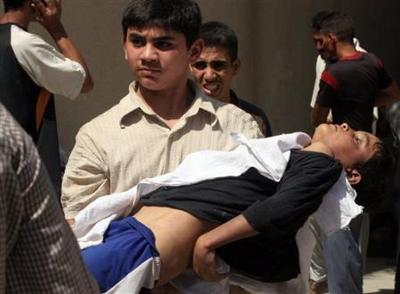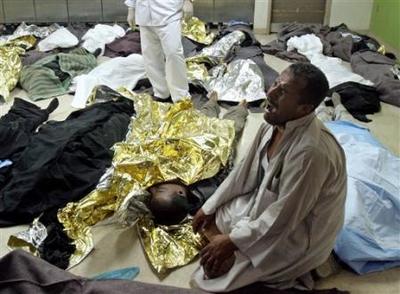Hurricane Hugo at the U.N.

By Mike Whitney
09/18/05 "ICH" -- -- "Practically no one in the United States knows that we've donated millions of dollars to the governorship of Louisiana, to the New Orleans Red Cross. We're now giving care to more than 5,000 victims, and now we're going to supply gasoline, freely in some cases, and with discounts in other cases, to the poorest of communities, starting with New Orleans and its surroundings... We've been helping. And we've been even rescuing people." Venezuelan President Hugo Chavez; "Nightline" with Ted Koppel, 9-16-05
Hugo Chavez's performance at the UN was greeted with the bucket-loads of bile that one expects from America's rightward-titling media. Washington Post hatchet-man Colum Lynch provided a typical summary of the speech by dismissing it as "a rant" from the Venezuelan "bad-boy". But, Lynch isn't alone in his hostility; the outpouring of venom came from all corners; appearing in many newspapers across the nation, invoking the hackneyed expressions of contempt for any foreign leader who rebuffs Washington or who follows redistributive economic policies.
In fact, the speech was a brilliant and impassioned analysis of the current state of the world and of the United Nations. Chavez noted that the original intention of the gathering had been "completely distorted" by the so-called reform process introduced by John Bolton. The reforms are entirely designed to transform the UN into a cats-paw for American power creating greater flexibility for Washington's preemptive wars and for dismantling the foundations of international law. They signal the demise of the UN as a legitimate forum for world development and an invitation for Bush and co. to act with even greater impunity.
The Bush administration's maneuvering has successfully sabotaged the efforts made by the international community for real improvement. The goals of the Millennium Summit, to reduce hunger, poverty and ignorance, will not be achieved and the mission of the UN has been effectively torpedoed by Bolton's machinations. Chavez speech draws this same obvious conclusion: "Friends of the world, The United Nations has exhausted its model, and it is not all about reform. The XXI century claims deep changes that will only be possible if a new organization is founded. This UN does not work. We have to say it. It is the truth."
Chavez's remarks are not intended to disgrace the UN, but to offer a different vision for the future. He recognizes the pressing requirements of the new century and realizes that many of these problems "do not have a national solution: radioactive clouds, world oil prices, diseases, warming of the planet or the hole in the ozone layer. These are not domestic problems."
Chavez proposes his own set of reforms for the UN, including expansion of the Security Council, greater transparency, increasing the powers of the Secretary General, and "suppressing" the power of one nation to veto resolutions made by the council. But, he does not believe that reforms are enough by themselves and insists that the UN be transformed completely, beginning with a change of venue from New York to an "international city with its own sovereignty". Chavez's logic is inescapable; if the United States continues to flaunt UN resolutions and violate international law, as it has with the Iraq war, it should not be host to the world body. Chavez's suggestion was not made to humiliate the United States, but to demonstrate the urgency of the calamity the world faces if action is not taken swiftly on matters of mutual concern. Chavez takes a keen interest in these issues even though Washington chooses to ignore them.
"Ladies and gentlemen, we are facing an unprecedented energy crisis in which an unstoppable increase of energy is perilously reaching record highs, as well as the incapacity of increase oil supply and the perspective of a decline in the proven reserves of fuel worldwide. Oil is starting to become exhausted.
For the year 2020 the daily demand for oil will be 120 million barrels. Such demand, even without counting future increments- would consume in 20 years what humanity has used up to now. This means that more carbon dioxide will inevitably be increased, thus warming our planet even more."
Chavez cogently draws a straight line between global warming to the devastation of Hurricane Katrina; the first major city lost because from rising ocean temperatures. He deftly connects the tragedy to the neoliberal economic model which continues to thrust the world in a catastrophic direction.
"It is unpractical and unethical to sacrifice the human race by appealing in an insane manner the validity of a socioeconomic model that has a galloping destructive capacity. It would be suicidal to spread it and impose it as an infallible remedy for the evils which are caused precisely by them."
Chavez also defended his record as a reformer and a man willing to take risks for the sake of his own people. In one particularly stinging remark, he noted the progress that had been made in Venezuela since 9-11, while the Bush administration was busy using the pretext of terrorism to violate international law and initiate hostilities against Iraq.
"One million four hundred and six thousand Venezuelans learned to read and write. We are 25 million total. And the country will, in a few days, be declared an illiteracy-free territory. And three million Venezuelans, who had always been excluded because of poverty, are now part of primary, secondary and higher studies.
Seventeen million Venezuelans, almost 70% of the population, are receiving, and for the first time, universal healthcare, including the medicine, and in a few years, all Venezuelans will have free access to an excellent healthcare service. More that a million seven hundred tons of food are channeled to over 12 million people at subsidized prices, almost half the population. One million gets them completely free, as they are in a transition period. More than 700 thousand new jobs have been created, thus reducing unemployment by 9 points. All of this amid internal and external aggressions, including a coup d'etat and an oil industry shutdown organized by Washington."
Unlike Bush, Chavez's record is backed up by a solid performance in nearly every area of social development. Its no wonder the elitist American media, driven by their class-based ideology, has tried so desperately to discredit him.
Chavez oratory to the General Assembly will undoubtedly elevate him in the eyes of many as a serious futurist who offers genuine solutions for a war-ravaged planet. His personal fortitude and optimism are matched by his selfless conduct as President; working persistently on behalf of his people and strengthening global relations. His iconic image around the world is well deserved.
"We will fight for Venezuela, for Latin American integration and the world. We reaffirm our infinite faith in humankind. We are thirsty for peace and justice in order to survive as species... Now is the time to not allow our hands to be idle or our souls to rest until we save humanity."
His speech was received with thunderous applause.
(Note: "Operation Balboa; the plan to invade Venezuela; President Chavez announced on "Nightline" Friday edition 9-16-05 that, "I have evidence that there are plans to invade Venezuela. Furthermore, we have documentation: how many bombers will over-fly Venezuela on the day of the invasion, how many trans-Atlantic carriers, how many aircraft carriers need to be sent to (inaudible) even during (inaudible)." The US is carrying out maneuvers at Curacao Island, and Chavez claims to have documentation to back up his allegations. "The plan is called Balboa and Venezuela is indicated as its objective.")
See also: - President Chavez's Speech to the United Nations: - Transcript: Hugo Chavez Nightline Interview:
Link Here




























